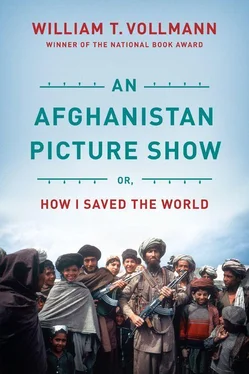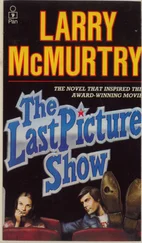And she rocked him in her arms, but he could not cry, being made of wood.
He knew that eventually he’d rot or burn or get lost among her worn-out stuffed animals (those other refugees from the Land of Counterpane, lovestained and tearstained, gaping at the world through scratched glass eyes); or the girl would grow up, nervous at first because the training wheels were off the bicycle, but the day she stopped being afraid of falling was the day she’d be too big to listen to the reading of Just So Stories , and that was when she’d get tired of him, because he could never be anything new. So he had the certainty of a negative future. He decided, therefore, to make the best of the present. Maybe she’d buy him clothes, or a toy gun…
But as the days went like clock-hands crossing, he began to miss the wooden airplane. The view at the window seemed the same, even though the leaves turned red and yellow and then curled and dropped off, and the children came back from school with their books in their arms, going around the corner until they were lost in gold leaf-shimmers; and while it was very nice to sit by the fireplace, the heat soon began to dry him out and warp him. Yes, her bed was lovely, but sometimes he’d get thrust under one of the pillows where he could scarcely breathe; or she’d jog him carelessly with her elbow. Even wood can feel, although his thoughts were empty like bombed-out villages with crossbeams of shadow resembling gallowses, rubble and emptiness inside the roofless rooms whose cracked walls were still strangely straight-topped; and through doors and window frames he could see the mountains to which the survivors must have fled. — One day he said that he had to be going. (At least he would have said that if his mouth were anything more than painted on.) He went out into the rain and found his downed craft in a stubbly field. With leaf and rubber band he made emergency repairs; then he took off again on his mission, which was to get from Point A to Point B. He skimmed his way through the backyard airspace of white houses, glimpsing sometimes the children at piano practice, or the families out together in their colorful automobiles…
Now, which do you think would be a sadder fate — to be rescued time and time again by the same person, and find that the accumulating separations were making her simultaneously more distant and more stale, or to travel forever through an afternoon above the many gardens, being rescued by different girls (that is every Young Man’s dream), for him the familiarity of an unfamiliar elbow in bed, the knowledge that the afternoon would go on and on like this until he broke? — At least in the latter case he’d be going Somewhere; whereas to be rescued by his first love again and again he’d have to fly in circles around her house, its field and brook. (Not that this is objectionable in principle: a kite is not unhappy for being attached to a string.)
The airplane beside the Young Man’s charpoy had no pilot. Something must have happened to him. Either he’d gotten killed or he’d gotten permanently rescued. Of course, everyone gets permanently rescued eventually (when one gets killed). But isn’t it better to get an early start on death, so as to at least taste permanence on one’s own terms?
The airplane still twirls and twirls there above the guerrilla camp, every afternoon, but for its pilot there must have finally come an hour when the lights came on, and the children were getting ready for bed, and there was time for only one more emergency landing.
HELPLESSNESS [8]
The day passed. The battle was postponed. A skirmish with some Gulbuddin men had occurred, Poor Man said; someone had been injured. The Commander in Blue prepared for the Young Man a marvelous dish of tomatoes, cucumbers, onions and peppers, all sliced thin and covered with salt.
Shadows began to stain the red hill across the valley. The Young Man’s own afternoon was ending. Flying finally on his night mission through the clouds of sleep, he sat among the red lights of the cockpit, bomb-bay switches in hand to deal with any nightmare, but as he flew on and on, he understood that anyone who might have been able to rescue him, should he need it, was long since in bed; that the fields and gardens had grown in the dark, widening and drying and crinkling into vast mountains, the entire Hindu Kush; and sand and snow and icy, filthy streams all around him, no moon in sight, and the Roos picking up the tenor of his night thoughts on their electronic gear — and he realized that he had succeeded in his objective of several years, which was to get himself in deep trouble.
He imagined being caught with the Mujahideen in some sandy gulley by a patrol of the Roos . They must surrender; they were disarmed. Then, one by one, the prisoners ahead of him were machine-gunned. Did he say, “Ameriki!”—at first softly, out of shame, then in a shout, so that everyone heard, and the Mujahideen, the doomed ones, turned their backs on him contemptuously, the guards understanding him at last, pulling him away, offering him water before his first beating, primping him for his television appearance as a spy, as meanwhile the Mujahideen, muttering earnestly, “Allah, Allah,” were shot behind him? — Or did he loudly insist, “Yah — Afghan!” as the guards led him up for execution, and as he hid his glasses to hide his foreignness, the fanatic Gholam Sayed, who had not permitted the Young Man to give Suleiman medicine when he was sick, ibecause it was Ramazan, cried to the guards, “Mr. Ouilliam — Kaffir, na Muslim!” jso that he would not even have the satisfaction of that stand? Which, oh which would have been worse?
HELPLESSNESS [9]
The Commander in Blue invited him to accompany them on the raid. He lay in his charpoy , trying to ignore the flies, waiting for the sun to come up, the ordeal to begin. At 4:30 a.m. he had tea and eggs in the tree-house while the Commander in Blue stared into the foliage. At 6:45, old Elias came to him. —“Alootooka — chakar!” he cried. — Right, he thought skeptically, but the old man kept grabbing his arm and yelling, so he put on his shoes, took a camera, and ascended the red hill. As always, there was nothing but a group of Mujahideen practicing with their guns. They were astonishingly good marksmen. Maybe he had been too slow to see the plane.
HELPLESSNESS [10]
They were to leave for the battle at ten. At twenty of eleven the whole camp was asleep. The Commander in Blue, that source of kebabs and consolation, lay wrapped in a cloth in his loft. No tours for the Young Man today, no viewing of the anti-aircraft gun, no U.N.I.C.E.F. tablets of condensed milk with sugar glaze to cheer him, no Poor Man for him to pester. At least some new guests were here, travelers carrying grenades to Herat, who distracted most of his flies. The sky was cloudless. In an hour and a half it would be time for the pathetic dusty rain.
THE RED HILL [7]
The hill was not that red, actually, but more of an ocher color. It was a series of nondescript curves with local exceptions, such as the Russian and Bulgarian food tins, the spring, the stone walls, the shooting pits, the dead bombs. On the whole, the hill still interested him because he was careful not to look at it too much. He had a feeling that if he ever became bored with it, that is, really bored with it, there would be difficulties for him. Every day, Suleiman and Elias sat up there behind the dusty trees, watching for the Roos with their binoculars, and their Kalashnikovs gleamed in the sunshine, every curving groove of the banana magazines outlined in precious silver, and the wooden stocks gleamed and glowed, and the sun was white on the two men’s caps and noses and foreheads, and it seemed that the world ended just behind them because they sat at the very tip of the ridge, beyond which the mountains fell into a distant sun-dusted wrinkle of bluish-gray dunes far below like waves of infinity; in this sea the Roos trolled. And so Suleiman and Elias trolled for the Roos .
Читать дальше












